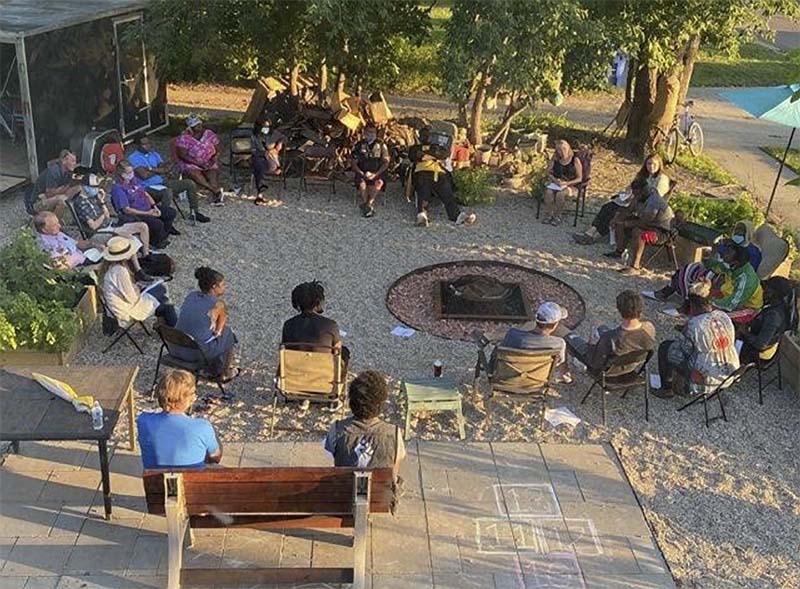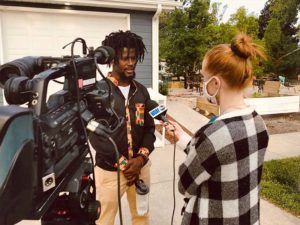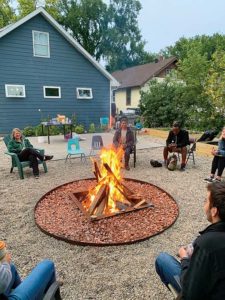



By Lindsey Lugsch-Tehle
Though this past year has been rife with untold challenges, the Baha’is of Fargo, North Dakota, have been learning to integrate prayer gatherings into the life of the community around them. As the pandemic took hold, many Baha’is throughout North Dakota — whose communities are sparse and had long been using virtual platforms to connect — found themselves somewhat prepared to shift from in-person to online gatherings. Quickly, communities across the state coordinated their efforts to host daily virtual devotionals, providing a much-needed sanctuary for souls to connect to the Word of God and be a solace for one another during this difficult time.
About three months into the pandemic, a small team from the Baha’i community in Fargo recognized that devotional gatherings are a communal strength, so they set out to build upon it by hosting monthly virtual interfaith meetings.
Over time, the interfaith devotional has become a space where people from varied backgrounds join together to reflect on themes such as gratitude, service, and compassion. They talk about how such themes affect individual and collective life.

After a summer of immense national heartache, the team, under the direction of the nine-member Spiritual Assembly of Fargo, the governing body for the local Baha’i community, collaborated with a few other Baha’is to host a virtual devotional gathering on race amity.
One of them, Joseph Lewis, a recent college graduate, had been engaged in meaningful conversations with like-minded people including community organizers, policy-makers and law enforcement officials.
Lewis and his friends saw an opportunity to invite the wider community to “a space that creates room for people to share their stories and to foster friendship among community members on the path to racial healing,” Lewis says. They organized the Ubuntu Racial Dialogue inspired by the principle of Ubuntu, an African tradition which means “I am because we are.”
According to Lewis, “The goal of the dialogue has been for community members to engage in an open, honest, and heart-to-heart transformational dialogue around the subjects of race, diversity, and tolerance.”
Recognized as a “place for healing and friendship,” the Ubuntu Racial Dialogue made local news and has become a space where Fargo Police officers, social justice activists, the mayor, and the others in the wider community have felt “safe, seen, and heard,” says Lewis.


Lewis joined with the interfaith devotional team to co-host a prayer gathering titled “The Pupil of the Eye,” inspired by writings of the Baha’i Faith that liken Black people to the pupil of the eye of humanity, through which “the light of the spirit shineth forth.”
After prayers and inspirational readings, participants shared their thoughts and experiences on what this metaphor might mean and how it may shed light on individual and collective efforts to establish unity through diversity in Fargo.
“This space proved to be one in which individuals of all backgrounds were able to express their views in earnest,” says Adam Lugsch-Tehle, one of the hosts of the devotional. This diverse group “came forward to share their hopes and fears for the benefit of all, that we may learn from one another how to go about building a better world, a better Fargo.”
At the conclusion, participants were invited to continue the conversation about race amity and begin to explore avenues for collective service. Some joined a study of the first book in the sequence of courses of the Ruhi Institute, Reflections on the Life of the Spirit, a text that explores identity within the context of the Baha’i teachings.


![]()
![]()
Whether you are exploring the Bahá'í Faith or looking to become an active member, there are various ways you can connect with our community.
Please ensure that all the Required Fields* are completed before submitting.